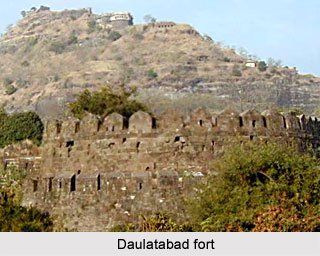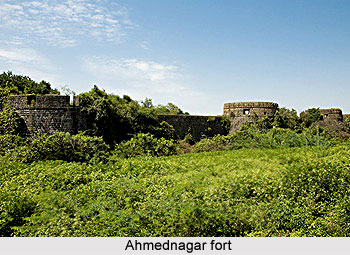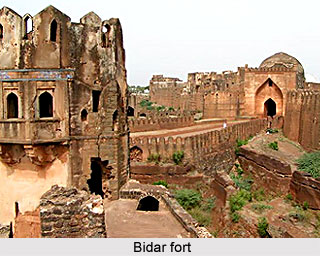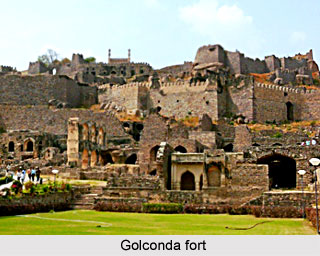 Deccan policy of the Mughal dynasty was weak during the reign of Babur and Humayun. When Babur attacked India there were six Muslim states, viz Khandesh, Berar, Ahmednagar, Bijapur, Golconda and Bidar and one Hindu state Vijayanagara in the south. According to Babur the state of Vijayanagara was the strongest among them. However Babur and Humayun could not pay any attention towards the south. By the time, Akbar interfered in the politics of the Deccan the political situation had changed there. In January 1565 A.D. the combined forces of Bijapur, Golconda, Bidar and Ahmednagar defeated the army of Vijayanagara in the battle at Talikota and completely ruined the power of Vijayanagara. Akbar began to extend his empire towards the south and the rest of the Mughal emperors till Aurangzeb followed his policy.
Deccan policy of the Mughal dynasty was weak during the reign of Babur and Humayun. When Babur attacked India there were six Muslim states, viz Khandesh, Berar, Ahmednagar, Bijapur, Golconda and Bidar and one Hindu state Vijayanagara in the south. According to Babur the state of Vijayanagara was the strongest among them. However Babur and Humayun could not pay any attention towards the south. By the time, Akbar interfered in the politics of the Deccan the political situation had changed there. In January 1565 A.D. the combined forces of Bijapur, Golconda, Bidar and Ahmednagar defeated the army of Vijayanagara in the battle at Talikota and completely ruined the power of Vijayanagara. Akbar began to extend his empire towards the south and the rest of the Mughal emperors till Aurangzeb followed his policy.
The process of conquering the south was slow but the Mughals finally succeeded during the reign of Aurangzeb. The Marathas had established an independent kingdom in the Deccan at that very time when Aurangzeb was bent upon to conquer the entire south. Aurangzeb, of course destroyed the Maratha kingdom but his success was short-lived. The Maratha foamed back for the independence of Maharashtra and finally succeeded. Thus, the Deccan policy of the great Mughals initially succeeded but ultimately failed.
 Babur could pay no attention towards the south. During the reign of Humayun there was no planned policy towards the Deccan. Akbar was the first among the Mughal emperors who planned to conquer the Deccan after completing his conquest in the north.
Babur could pay no attention towards the south. During the reign of Humayun there was no planned policy towards the Deccan. Akbar was the first among the Mughal emperors who planned to conquer the Deccan after completing his conquest in the north.
In 1591 A.D., Akbar sent his ambassadors to Khandesh, Ahmednagar, Bijapur and Golconda and asked them to accept his sovereignty. After many years of hard fighting the Mughals succeeded in capturing the territories and forts of Berar, Ahmednagar and Daulatabad. The Mughals attacked Khandesh, captured the forts of Burhanpur and Asirgarh and finally annexed all territories of Khandesh to the empire. Akbar failed to take any action against Bijapur and Golconda during his life-time. Thus, Akbar annexed Khandesh, captured a part of the territory of Ahmednagar, occupied a few strong forts like Daulatabad, Ahmednagar, Burhanpur, Asirgarh etc., and thus not only established the power of the Mughals in the Deccan but also paved the way for the conquest of the Deccan for his successors.
 Jahangir continued the policy of his father towards the Deccan. He attempted to annex Ahmednagar and force the rulers of Bijapur and Golconda to accept his suzerainty. But, the Mughals met a serious challenge to their designs by Malik Ambar, the wazir of Ahmednagar. Malik Ambar improved the economy of Ahmednagar, trained Maratha soldiers in guerilla system of warfare, fought aggressive wars against the Mughals and during the early period of the reign of Jahangir recovered the fort of Ahmednagar and some other territory of the state of Ahmednagar from the Mughals. In 1617 A.D., prince Khurram attacked Ahmednagar and forced it to sign a treaty by which Ahmednagar surrendered the fort of Ahmednagar and the territory of Balaghat to the Mughals. Jahangir gave the title of Shah Jahan to prince Khurram at that very time. But Ahmednagar was not prepared to accept the sovereignty of the Mughals and started fighting against them again. However, peace was again signed between the two in 1621 A.D. by which Ahmednagar surrendered a part of its territory to the Mughals and also paid rupees eighteen lakhs in cash. Bijapur and Golconda which had helped Ahmednagar also paid rupees twelve lakhs and rupees twenty lakhs respectively to the Mughals.
Jahangir continued the policy of his father towards the Deccan. He attempted to annex Ahmednagar and force the rulers of Bijapur and Golconda to accept his suzerainty. But, the Mughals met a serious challenge to their designs by Malik Ambar, the wazir of Ahmednagar. Malik Ambar improved the economy of Ahmednagar, trained Maratha soldiers in guerilla system of warfare, fought aggressive wars against the Mughals and during the early period of the reign of Jahangir recovered the fort of Ahmednagar and some other territory of the state of Ahmednagar from the Mughals. In 1617 A.D., prince Khurram attacked Ahmednagar and forced it to sign a treaty by which Ahmednagar surrendered the fort of Ahmednagar and the territory of Balaghat to the Mughals. Jahangir gave the title of Shah Jahan to prince Khurram at that very time. But Ahmednagar was not prepared to accept the sovereignty of the Mughals and started fighting against them again. However, peace was again signed between the two in 1621 A.D. by which Ahmednagar surrendered a part of its territory to the Mughals and also paid rupees eighteen lakhs in cash. Bijapur and Golconda which had helped Ahmednagar also paid rupees twelve lakhs and rupees twenty lakhs respectively to the Mughals.
Shah Jahan also attempted either to annex the kingdoms of the Deccan or force them to accept the suzerainty of the emperor. He was a capable commander and understood the politics of the Deccan well. The death of Malik Ambar gave him good chance to put pressure on Ahmednagar and eventually Ahmednagar was annexed to the Mughal Empire. Aurangzeb, when appointed as governor of the Deccan for the second time in 1652 A.D., he pressurised Golconda because it had failed to pay the annual tribute to the Mughals. Aurangzeb waited for an opportunity and he got it when Mir Jumla, one of the most prominent nobles of the Sultan, quarreled with him and sought protection from Aurangzeb. Aurangzeb captured Hyderabad and besieged the Golconda fort. But before he could capture it he received orders of Shah Jahan to raise the siege. Therefore, a treaty was signed between the two by which Golconda accepted the suzerainty of the Mughal emperor.
Therefore, a treaty was signed between the two by which Golconda accepted the suzerainty of the Mughal emperor.
The attempt of the Mughals to capture Bijapur in 1631 A.D., however, failed. The Mughals again attacked it in 1636 A.D. and forced it to accept their suzerainty. Shah Jahan ordered Aurangzeb to attack Bijapur. Aurangzeb besieged the fort of Bijapur but before he could capture it, he received orders of Shah Jahan to raise the siege. A treaty was, therefore, signed between the two by which Bijapur accepted the suzerainty of the Mughal emperor and agreed to pay rupees one and a half crores to the Mughals. The forts of Bidar and Kalyani also remained with the Mughals. Thus, the Deccan policy of the Mughals during the reign of Shah Jahan remained quite successful.
Aurangzeb`s policy towards the Deccan had political as well as religious purpose. The extension of the empire was one purpose of Aurangzeb. Probably it is believed that extinction of the states of Bijapur and Golconda was a prior necessity for the destruction of the power of the Marathas in the Deccan. Besides this political motive, he desired to annex these states because their rulers were Shias. Bijapur had failed to fulfill the terms of the treaty of 1657 A.D. The political situation was also very vulnerable because Adil Shah died in 1672 A.D. and was succeeded by his four-year son, Sikandar Adil Shah. The Mughals took advantage of it and attacked Bijapur in 1676 A.D. but with no results till Aurangzeb himself reached the Deccan. Bijapur was finally annexed to the Mughal Empire and so was Golconda. The conquests of Bijapur and Golconda did not complete the conquest of the Deccan by Aurangzeb.
The Deccan policy of the Mughals reached the perfection of its success during the rule of Aurangzeb. But it was a temporary success. Aurangzeb failed to consolidate his success. The Marathas rose against him and brought about the collapse of his Deccan policy. The failure of the Deccan policy of Aurangzeb participated in the disintegration of the Mughal Empire.



















